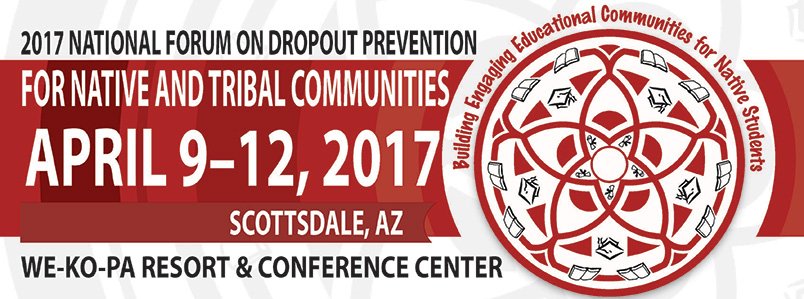The 2017 National Forum on Dropout Prevention for Native and Tribal Communities is a professional learning activity sponsored by The National Dropout Prevention Center, in partnership with the Arizona Department of Education, Alaska Staff Development Network, the Alaska Council of School Administrators, the Salt River Pima-Maricopa Indian Community, and the Native American Fatherhood and Families Association.
The Forum will feature nationally known keynote speakers as well as professional educators. Presentations will emphasize a variety of strategies that work with native students who are at risk of dropping out of school before high school graduation. The conference strands are (1) addressing the opportunity gap, (2) instructional strategies to increase learning, (3) behavioral supports, (4) family and community engagement, (5) school climate: safety and student wellness, (6) service-learning and restorative justice, (7) digital communication and engagement, (8) reengagement and recovery strategies, and (9) culture and language.
Addressing the Opportunity Gap
Research has been accumulating for years that show us that the achievement gap is embedded in the opportunity gap. While there has been much focus over the last 30 years on closing the achievement gap, little has occurred to diminish it. We now know that we will not close the achievement gap until we address the opportunity gap. Students must have opportunities to learn no matter what their background is. The good news is: There are many exciting and engaging ways to build the capacity for these opportunities for students to learn. These sessions will explore some of these options and offer practical solutions that communities can implement.
Instructional Strategies to Increase Learning
These sessions highlight current research and recommended classroom practices and instructional frameworks in academic/instructional areas. Sessions are designed to engage participants in activities that will help them understand how to use these research-based strategies to boost student achievement and graduation outcomes and provide necessary supports for students.
Behavioral Supports
Youth practitioners, educators, and https://dropoutprevention.org/wp-content/uploads/2022/09/C.W.-Gardenhire-pic.jpgistrators find themselves facing increasing situations that require a behavioral change on the part of a young person, parent, or even staff member. This strand seeks to introduce strategies that can be used to address behavioral and/or attitudinal episodes.
Family and Community Engagement
These sessions provide information about the vital role that family members and the broader community play in the education, growth, and development of young people; focusing upon the role they can play to ensure high-quality education for all students. Strategies will address how family and community involvement and partnerships can improve schools in order to increase student achievement and success.
School Climate: Safety and Student Wellness
This strand looks at the strategies and resources available to create a school environment where all members are welcomed, supported, and feel safe in school: socially, emotionally, intellectually, and physically. Sessions may explore strategies for building strong staff buy-in and commitment to initiatives, creating and sustaining unified vision for student achievement, and the use of effective school climate measures.
Service-Learning and Restorative Justice
Service-learning projects can strengthen young peoples’ sense of their own effectiveness and help them develop meaningful relationships with their community outside of their own peer groups. Service-learning has a positive impact on young peoples’ civic and educational attitudes and school performance while they meet community needs. This strand focuses on integrating successful service-learning models using community members to ensure students understand the relevance of classroom instruction to real-world challenges and experiences.
Digital Communication and Engagement
The digital age is upon us and is present in all areas of education. Students today are born into digital technology, and as technology continues to evolve, it is constantly providing new and innovative ways to engage students. With the proper technological tools, students become a part of their learning, immersed in their experiences. These sessions will provide information on how to effectively engage students utilizing technology, both in and outside of the classroom, and provide strategies on how to incorporate technology in all aspects of student learning.
Reengagement and Recovery Strategies
The statistics on dropouts are so alarming that many people do not hear them anymore. As we work to address the needs of current students by providing a more engaging and opportunistic learning environment we must not forget those whom the system already failed. These sessions will look at the current state of dropouts and offer possible strategies that communities can use to reach out to young people who have left the education system and work with them to develop a plan to obtain their high school diploma and move on to postsecondary work.
Culture and Language
Culture and language are essential and integral components of education for American Indian students. Research has proven that embedding culture and language into the curriculum results in increased student engagement and achievement. These sessions will examine the current state of Native languages, important language revitalization efforts, strategies to successfully embed cultural components into the development of curriculum, and promote best practices and effective teaching strategies that incorporate Native language and culture.
Leadership, Legislation, and Governance
It is becoming more and more important that leadership at all levels – federal, state, LEA, and community – work together as stakeholders in the education of our Native American students. Legislation in the form of the Every Student Succeeds Act (ESSA) mandates that there be consultation with area tribes by state educational agencies and local educational agencies regarding the use of ESSA funds for tribal members. Never before have tribal councils and state education departments been called to collaborate in the best interest of Indigenous students as they are now. These sessions will provide details and clarification on how all of these components fit into the grand scheme of Indian Education.

